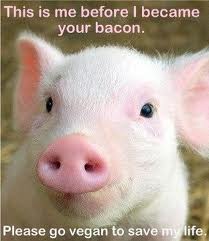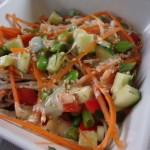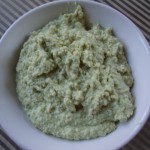How to NEVER Get Cancer
I know I’m not alone when I say that I have seen way too many friends and loved-ones die of cancer. It needs to stop. Can it? The origin of many cancers are unknown. So how do you avoid getting it, or seeing another family member be taken away because of it? According to Prevention and Dr. Thomas Sellers, PhD, associate director for cancer prevention and control at Moffitt Cancer Center in Tampa, “As many as 70% of known causes of cancers are avoidable.” Here’s a list of ways to never get cancer–in addition to exercising and avoidance of tobacco products, of course (from the President’s Cancer Panel):
1. Filter Your Tap Water: It’s considered safer than even bottled water. Be sure to store the filtered water in stainless steel or glass containers since BPA can leach from plastic bottles.
2. Stop Topping Your Tank Off: One last squirt from the pump after the nozzle clicks off can spill fuel and foil the pump’s vapor recovery system, designed to keep toxic, cancer-causing chemicals out of the air and your lungs.
3. Marinate Meat Before Grilling: Well, first off, this reiterates why we shouldn’t eat meat. I include this one because not only is it on the list, but to hopefully let my wonderful non-vegan friends and family see my point (because I love them)! Processed, charred, well-done meats can contain cancer-causing heterocyclic amines, which form when meat is seared at a high temperature, and polycyclic aromatic hydrocarbons, which get into the food when it’s charcoal broiled. “The recommendation to cut down on grilled meat has really solid scientific evidence behind it,” says Cheryl Lyn Walker, PhD. If you do grill (boo! hiss!) add rosemary and thyme to the poor dead animal’s marinade for an hour before cooking. Rich in antioxidants, the spices cut the HCAs by as much as 87%. Just remember, that’s not a 100%, nor just red meat. It goes for poultry, pork and other meats.
4. Caffeinate Every Day: Now this one I can really get used to! I do love me an almond milk latte often. People who drank 5+ cups of coffee a day had a 40% decreased risk of brain cancer, compared to people who drank less in a 2010 British study. (Better trade that tea for coffee, Brits)! It was also found that it reduced risks of cancers of the pharynx and mouth by nearly 50%. Start brewing!
5. Water Down Your Risks: Drink at least 8 cups of water or other liquids to reduce the risk of bladder cancer by diluting the concentration of cancer causing agents in urine.
6. Load up on REALLY Green Greens: I really love this one, too! The greener the veggie, the more magnesium you’ll absorb. It has been shown to lower the risk of colon cancer in women. Munch on 1/2 C of cooked spinach and get 75 mg of magnesium–20% of your daily allowance.
7. Snack on Brazil Nuts: A great source of selenium, an antioxidant that lowers the risk of bladder cancer in women.
8. Burn Off This Breast Cancer Risk Factor: Moderate exercise such as brisk walking 2 hours a week cuts risk of breast cancer 18%. Fat produces its own estrogen (a known contributor to cancer), so fat-burning exercise is vital!
9. Ask Your Doc About Breast Density: Women whose mammograms have revealed breast density reading of 75% or more have a cancer risk 4-5 times higher than women with low density scores. Researchers think that the denser the breast, higher levels of estrogen are present. This also goes back to #8–exercise.
10. Skip the Dry Cleaner: So that favorite silk blouse of yours? Yea, learn to either hand wash it or spot clean it with white vinegar. A solvent known as perchlorpethylene that dry cleaners often use, may cause liver and kidney cancers and leukemia.
11. Head Off Cell Phone Risks: Another good reasons to use your hands-free device. It keeps the radio frequency energy away from your noggin, however, evidence as to whether or not cell phones cause an increase in brain cancer risk is inconclusive. Despite this, a number of review studies suggest there’s a link.
12. Block The Sun With Color: When it comes to avoiding skin cancer, it was found that blue and red fabrics offered significantly better sun protection against the sun’s UV rays than white or yellow ones did. And wear a hat! It has been found that those with melanoma on the scalp or neck die at almost twice the rate of people with the cancer on other areas of the body.
13. Eat Clean Foods: How often have you heard this one? Well, it’s a biggie. Hormones and antibiotics in meat are suspected of causing endocrine problems, including cancer. Make sure you buy organic fruits and veggies as much as possible, too. “At least 40 known carcinogens are found in pesticides and we should absolutely try to reduce exposure,” says Sellers.
Wise Words from a Fellow Vegan
I came across this lovely blog by Dr. Stanley Sapon who has been a vegan since 1976. He put together A Philosophy of Vegan Values that I thought I’d share with all of you.
- Vegans see life as a phenomenon to be treasured, revered and respected. We do not see animals as either “The Enemy” to be subdued, or the Materials for Food, Fabric or Fun that were put on Earth for human use.
- Vegans see themselves as a part of the natural world, rather than its owners or its masters.
- Veganism recognizes no expendable or superfluous species that humans are free to hurt or destroy. Species of life-forms need not justify their existence, nor plead for protection from extinction on the grounds of their potential usefulness as food or medicine for humans. We continue to be burdened and misguided by adages such as “A weed is a plant we have not yet found a use for.”
- Veganism acknowledges the intrinsic legitimacy of all life. It rejects any hierarchy of acceptable suffering among sentient creatures. It is no more acceptable to torment or kill creatures with “primitive nervous systems” than those with “highly developed nervous systems.” The value of life to its possessor is the same, whether it be the life of a clam, a crayfish, a carp, a cow, a chicken, or a child.
- Veganism understands that gentleness cannot be a product of violence, harmony cannot be a product of strife, and peace cannot be a product of contention and conflict.
- Vegan ideals encompass much more than advocacy of a diet free of animal products, or a fervent defense of animal rights. Veganism excludes no sentient being–animal or human– from its commitment to compassionate, gentle benevolence. To show tender regard for the suffering of animals, yet treat humans with callous contempt, is a disheartening contradiction of Vegan principles.
- John Muir, talking about the natural environment, once observed “Every time I bend down to pick something up, I find it is connected to something else.” There is an equivalent “ecology” to our behavior. Everything we do connects to something else; every action touches on the world around us, either close at hand and noticeable, or far away and unperceived, immediate in its effect or distant in time.
- If Veganism has a prime value, it is simply that life-respecting compassion overrides individual issues of custom, convenience, comfort or cuisine.
- If there is a single article of faith, it is that commitment to Vegan values will bring us closer to a world in which the fate and fortune of a planet and all its life forms do not hang on the judgment or the generosity of one species.
- If there is one single concept that both generates and sustains the meaning and the power of the Vegan world-view, it is found in the word mindfulness. As Vegans, we strive to be thoughtful, aware and concerned about the impact of our choices, our actions and our decisions. The fruit of this awareness is inner peace, the quiet strength of ethical confidence, and an uplifting sense of fulfillment.
“The human body has no more need for cows’ milk than it does for dogs’ milk, horses’ milk, or giraffes’ milk.”
-Michael Klaper









